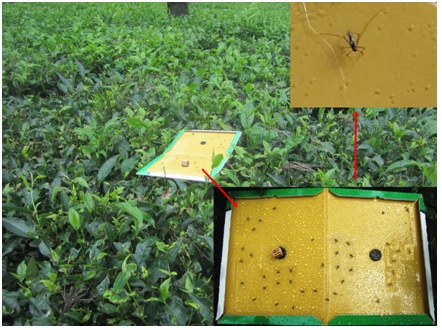Helopeltis theivora, tea mosquito bug (TMB) is considered as the most serious pest of tea in India, especially in Kerala, Tamil Nadu, Assam and West Bengal. This bug belongs to the Heteroptera, family that consists of insects/bugs which suck the sap from plants for their living. The bugs make punctures on the tea leaves and while sucking the sap inject toxic saliva into the leaf resulting the discoloration of the leaves and change in their taste. This affects the tea leaf quality and the export potential of the leaf. Due to recent changes in climatic conditions this insect has become more virulent. The bug infestation on tea plantation drastically reduce the yield, quality and the export value of the tea and it is estimated that 15-55% of the tea plantations are being affected by this pest alone. Complete wash out of crop has also been witnessed in many tea plantations.
Presently the use of synthetic pesticides is almost the only method of monitoring this pest.TMB infest tea plantation by laying their eggs safely inside the tea shoots and are thus well protected from pesticides and can survive all the odd circumstances. Quinalphos, Bifenthrin and Deltamethrinare used on tea plantations which leave harmful residues on tea leaves or alter the properties tea properties like taint, strength of liquor and taste etc.The increase in number of rounds of chemical application has been a common practice in tea.This indiscriminate use of synthetic pyrethroids and other chemicals leading to resurgence of n
Recently, a natural product that can attract TMBleading to their death was developed jointly by Dr. K. K Srikumar a scientist from UPASI Tea Research Institute, Valparai andDr. Pathipati Usha Rani a senior scientist from CSIR- Indian Institution of Chemical Technology (IICT), Hyderabad. The product has already been sanctioned the Indian patent. The team hasextensively worked to develop this new attractant composition which exhibited mating disruption in TMB by attracting the male TMB towards the source.Extensive field trials have been conducted in the tea plantations in and around tea plantations of Valparai area, Coimbatore (TN). The female TMB secretes chemicals that are highly attractant to male TMB. The extraction of this chemical and its stabilization lead to the trapping of the male TMB which can further lead to its killing in a sticky trap, thusthis new natural attractant composition provides a solution for the effective control of this pest on tea ew pests are becoming a serious concern. Pesticide residues in tea are causing a serious concern globally and several countries are revising the MRL of chemical pesticides downward. Due to the public concern over the toxicity and environmental impact of conventional synthetic pesticides, utilization of naturally occurring products extracted from biological sources has attracted the interest of the scientists of tea community. Lot of research pertaining to sexualattractioninHelopeltis and isolation of synthetic pheromones were carried out without successful field outcome.
